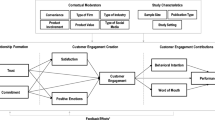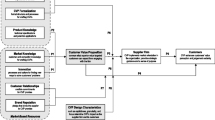Abstract
Research findings on the impact of economic bonus programs on service relationships are contradictory. While some studies find positive effects of economic bonus programs on customer’s relational behavior, other studies demonstrate negative effects. Building on self-determination theory, Dholakia (J Market Res 43(2):109–120, 2006) points at a possible explanation for these conflicting results, arguing that economic marketing programs have negative effects on self-determined customers when the program is perceived as controlling by them. By testing the effect of four different kinds of economic bonus programs on loyalty in an experimental setting using a nationwide representative sample of 768 participants, this research is the first that provides empirical evidence that economic bonus programs can indeed endanger service relationships by reducing customer’s self-determination. Implications of our findings for the abundance of economic bonus programs offered to service customers these days are highlighted.



Similar content being viewed by others
References
Amabile TM, Tighe EM, Hill KG, Hennessey BA (1994) The work preference inventory—assessing intrinsic and extrinsic motivational orientations. J Pers Soc Psychol 66(5):950–967
Baloglu S (2002) Dimensions of customer loyalty: separating the friends from the well wishers. Cornell Hotel Restaur Adm Q 43(1):47–59
Bansal HS, Irving GP, Taylor SF (2004) A three-component model of customer commitment to service providers. J Acad Market Sci 32(3):234–250
Barsade SG (2002) The ripple effect: emotional contagion and its influence on group behavior. Adm Sci Q 47(4):644–675
Cameron J, Banko KM, Pierce WD (2001) Pervasive negative effects of rewards on intrinsic motivation: the myth continues. Behav Anal 24(1):1–44
Chin WW (2001) PLS-graph user’s guide version 3.0, Houston, TX: Soft Modeling Inc
Deci EL, Ryan RM (2000) The ‘what’ and ‘why’ of goal pursuits: human needs and the self-determination of behavior. Psychol Inq 11(4):227–268
Deci EL, Ryan RM (2005) Intrinsic motivation inventory (IMI) Retrieved July 23, 2006 from http://www.psych.rochester.edu/SDT/measures/intrins.html
Dholakia UM (2006) How customer self-determination influences relational marketing outcomes: evidence from longitudinal field studies. J Market Res 43(2):109–120
Estell L (2002) Loyalty lesson. Incentive 176(11):38–41
Fornell C, Bookstein FL (1982) Two structural equation models: LISREL and PLS applied to consumer exit-voice theory. J Market Res 19(4):440–452
Geyskens I, Steenkamp JBEM, Scheer LK, Kumar N (1996) The effects of trust and interdependence on relationship commitment: a trans-atlantic study. Int J Res Market 13(4):303–317
Gruen TW, Summers JO, Acito F (2000) Relationship marketing activities, commitment, and membership behaviors in professional organizations. J Market 64(3):34–49
Gurhan-Canli Z, Batra R (2004) When corporate image affects product evaluations: the moderating role of perceived risk. J Market Res 41(2):197–205
Gustafsson A, Johnson MD, Roos I (2005) The effects of customer satisfaction, relationship commitment dimensions, and triggers on customer rentention. J Market 69(4):210–218
Hennig-Thurau T, Gwinner KP, Gremler DD (2002) Understanding relationship marketing outcomes: an integration of relational benefits and relationship quality. J Serv Res 4(3):230–247
Jones MA, Mothersbaugh DL, Beatty SE (2000) Switching barriers and repurchasing intentions in services. J Retailing 76(2):259–274
Jones T, Taylor S (2004) The nature and dimensionality of the commitment construct: does to whom or what we are committed matter?. In: 2004 AMS Conference Proceedings (no page numbers)
Kivetz R (2003) The effects of effort and intrinsic motivation on risky choice. Market Sci 22(4):477–502
Kivetz R (2005) Promotion reactance: the role of effort-reward congruity. J Consum Res 31(4):725–736
Kumar N, Scheer LK, Steenkamp JBEM (1995) The effects of supplier fairness on vulnerable resellers. J Market Res 32(1):54–65
LaPointe P (2002) Loyalty marketing’s newest challenges. Market News 36(21):16–17
Lee AY, Labroo AA (2004) The effects of conceptual and perceptual fluency on brand evaluation. J Market Res 41(2):151–165
McIllroy A, Barnett S (2000) Building customer relationships: do discount cards work?. Manag Serv Qual 10(6):347–355
Pritchard MP, Havitz ME, Howard DR (1999) Analyzing the commitment-loyalty link in service contexts. J Acad Market Sci 27(3):333–348
Roehm ML, Pullins EB, Roehm Jr HA (2002) Designing loyalty-building programs for packaged goods brands. J Market Res 39(2):202–213
Ryan RM (1982) Control and information in the intrapersonal sphere: an extension of cognitive evaluation theory. J Pers Soc Psychol 43:450–461
Ryan RM, Deci EL (2000) Self-determination theory and the facilitation of intrinsic motivation, social development, and well-being. Am Psychol 55(1):68–78
Sharp B, Sharp A (1997) Loyalty programs and their impact on repeat-purchase loyalty patterns. Int J Res Market 14(5):473–486
Shugan SM (2005) Brand loyalty programs: are they shams?. Market Sci 24(2):185–193
Surprenant CF, Solomon MR (1987) Predictability and personalization in the service encounter. J Market 51(2):86–96
Unger LS, Kernan JB (1983) On the meaning of leisure: an investigation of some determinants of the subjective leisure experience. J Consum Res 9(4):381–392
Verhoef PC, Franses PH, Hoekstra JC (2002) The effect of relational constructs on customer referrals and number of services purchased from a multiservice provider: does age of relationship matter?. J Acad Market Sci 30(3):202–216
Vroom VH (1964) Work and motivation. Wiley, New York
Wetzels M, de Ruyter Ko, van Birgelen M (1998) Marketing service relationships: the role of commitment. J Bus Ind Market 13(4/5):406–423
Wright C, Sparks L (1999) Loyalty saturation in retailing: exploring the end of retail loyalty cards. Int J Retail Distrib Manage 27(10):429–439
Yi Y, Jeon H (2003) Effects of loyalty programs on value perception, program loyalty, and brand loyalty. J Acad Market Sci 31(3):229–240
Acknowledgments
The authors thank Aneta Bludau for her help with the data collection and questionnaire design and Markus Groth for his helpful and constructive comments on a previous version of this paper.
Author information
Authors and Affiliations
Corresponding author
Appendix
Appendix
Table 4
Rights and permissions
About this article
Cite this article
Hennig-Thurau, T., Paul, M. Can economic bonus programs jeopardize service relationships?. Service Business 1, 159–175 (2007). https://doi.org/10.1007/s11628-006-0012-9
Received:
Accepted:
Published:
Issue Date:
DOI: https://doi.org/10.1007/s11628-006-0012-9




